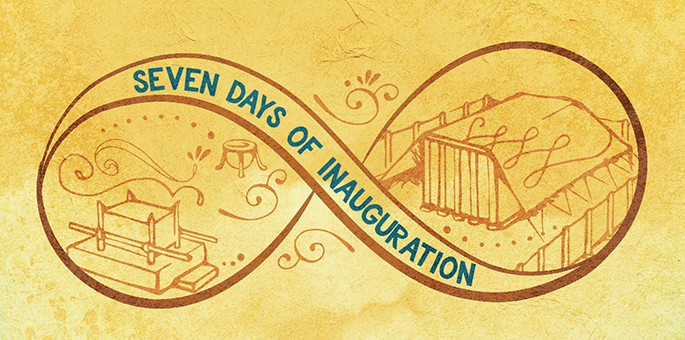The word shemini, which is the title of this week’s parshah, translates as “eighth” in Hebrew.
Towards the end of last week’s parshah, Tzav, we read about the Seven Days of Consecration. These seven days commenced on the 23rd of Adar in the year 2449, almost a year after the Exodus from Egypt. During this period, Moses erected and dismantled the Tabernacle and performed the prescribed service (i.e., brought all the offerings) each day.
In contemporary language, we’d call this week a “practice run.” Moses assumed the role of the High Priest throughout these seven days, and Aaron played the part of the customer.
One of the final verses of Tzav states, “And you shall not leave the entrance of the Tent of Meeting for seven days, until the day of the completion of your investiture days; he will inaugurate you for seven days.”1 The opening verse of Shemini reads, “And it was on the eighth (shemini) day that Moses summoned Aaron and his sons and the elders of Israel.”2
This “eighth day,” which served as the Tabernacle’s Opening Day, fell on the first day of the month of Nisan, also known as “the month of miracles.” It marked a transformation into the realm of the miraculous, as remarkable events unfolded. It was the first day of offerings; the first instance of fire descending from heaven onto the Altar; the first time that the Shechinah—the Divine Presence—dwelled in the Tabernacle.
Seven: Nature’s Rhythm
G‑d created the universe in six days, and on the seventh day, Shabbat, He rested. We find that so much of Jewish life, and life in general, is related to the number seven: from the seven days of the week, to the seven years of the Sabbatical cycle, to the grand Jubilee cycle spanning 49 years, consisting of seven Sabbatical cycles. Even the rainbow boasts seven distinct colors. Passover, the festival commemorating the Exodus from Egypt, is observed over a seven-day period according to biblical instruction, as is the festival of Sukkot.
Transcending Nature
In the teachings of Chassidism, the number seven signifies the natural world and the perfection that is attainable within its bounds. The number eight, by contrast, symbolizes that which is beyond nature and its inherent limitations. Eight is otherworldly; it is miraculous; it transcends the confines of creation.3
And that is why it was on the eighth day that the physical world transcended its limitations and became holy enough to be a dwelling—an abode—for G‑d Almighty.
Thus, while everything natural and normative in life and in Judaism is connected to the number seven, everything transcendent in Jewish life is connected to the number eight.
For instance, in next week’s parshah, Tazria, we will read, “If a woman conceives and gives birth to a male … on the eighth (shemini) day the flesh of his foreskin shall be circumcised.”4 The brit milah is performed on the eighth day (health permitting). Why not the seventh? Because the covenant, the bond between the Jew and G‑d, is not natural—it is otherworldly. Our connection to G‑d transcends logic—it is suprarational. Therefore, the circumcision is done on the eighth day and never before.
A New Festival
The Festival of Sukkot spans seven days, and during Temple times, the Jewish people offered 70 bulls as additional sacrifices throughout the holiday, corresponding to the 70 nations of the world. Each day, the number of sacrifices dwindled: 13 on the first day, 12 on the second, and so forth, until the seventh day, when 7 bulls were offered, totaling 70. These seven days were dedicated to invoking blessings upon every other nation on earth.
Then comes the unexpected twist. “The eighth (shemini) day shall be a time of restriction for you.”5 On this eighth day—following the seven-day Sukkot festival—G‑d essentially declares, “Just when you thought it’s over and you’re going home, behold, I am proclaiming a new festival!”
This festival, Shemini Atzeret, is actually considered a new festival. During candle-lighting and Kiddush on Shemini Atzeret, we recite the blessing of shehecheyanu, thanking G‑d for bringing us to this milestone. If this were merely the eighth day of Sukkot, we could not say this blessing.
How many bulls were offered as additional sacrifices on this day? Just one. G‑d tells the Jewish people, “This day is devoted exclusively to you. For seven days, we have done everything we could to bring blessings to the world at large. But now it’s your turn. This is your day. On this day the Jewish people will receive blessings.”
One sacrifice for the one nation chosen by the One G‑d. And when does this unique festival occur? On the eighth day!
Eight Days of Light
Another profound demonstration of the transcendent number eight is found in the Chanukah miracle.
To briefly recap: In the second century BCE, the Holy Land was ruled by the Syrian-Greeks who sought to impose Greek culture and beliefs upon the Jewish people. Against overwhelming odds, a small band of faithful Jews, led by Judah Maccabee, emerged victorious, defeating the Syrian-Greek army and reclaiming the Holy Temple in Jerusalem. Upon rededicating the Temple to the service of G‑d, they discovered only a single cruse of olive oil that remained untainted by the Greeks. With this meager supply, they kindled the Menorah, and miraculously, the one-day supply of pure oil lasted for eight days, until fresh olive oil could be prepared under conditions of ritual purity.
That is why we commemorate Chanukah with the number eight—eight days and eight lights. The miracle of Chanukah was so extraordinary, so beyond the natural order, that it’s no coincidence that the miracle lasted eight days.
The period leading up to the Chanukah miracle was one of intense darkness for the Jewish people. On Chanukah, we kindle the menorah, flooding the world with the illuminating energy of the miraculous number eight.
The Rebbe, therefore, instructed his disciples, not to suffice with lighting the Chanukah lights at the windows or doors in our homes, or even in our synagogues. Instead, he urged us to bring the message of Chanukah’s light to the entire world. Why? Because the number eight has the ability to saturate the world with otherworldly miracles, to infuse it with infinite Divine energy.
Moshiach’s Day
Biblically, the festival of Passover lasts for seven days. By rabbinic ordinance, however, an additional day of observance is added in the Diaspora, outside of the land of Israel. And so, we have an eighth day of Passover.
What is the theme of this day? Moshiach. It signifies the imminent end of our bitter exile and the arrival of Moshiach, who will usher in an era of peace and tranquility, and an end to terror, illness, and all things negative. All of this is symbolized by the eighth day of Passover.
The haftarah that we read on this day is the famous passage from Isaiah envisioning the era of Moshiach, a time when “the wolf will dwell with the lamb, and the leopard will lie with the kid goat; the calf and the young lion will graze together, and a young lad shall lead them.”6
Following a tradition instituted by the Baal Shem Tov, the waning hours of the eighth day of Passover are dedicated to Seudat Moshiach, a feast celebrating the Divine revelation in messianic times. This special meal is devoted to the belief that Moshiach’s arrival is imminent.
Again, we find that this unique, special day is on the eighth day.
On a personal note, my father and teacher, Rabbi Sholom B. Gordon, of blessed memory, would often share these teachings about the significance and symbolism of shemini and the number eight.
I vividly recall him discussing the significance of the brit milah being on the eighth day, and the additional Sukkot holiday, Shemini Atzeret, occurring on the eighth day. However, in my father’s teachings, the greatest illustration of the transcendent quality of the number eight was the eighth day of Passover—Moshiach’s day—because, in his words, “There is nothing more important than preparing the world and awaiting the coming of Moshiach.”
When, then, did G‑d choose for my father to return his soul to Him? Which day would Divine Providence have us observe his yahrtzeit? On the eighth day of Passover.
His tombstone, borrowing from the Rebbe’s words in the Hayom Yom entry of that day, fittingly states that he passed away on the eighth day of Passover, the day on which “the radiance of the light of Moshiach shines openly.”7
Eight-Stranded Harp
Chapter 12 of Psalms opens with, “For the conductor on the sheminit, a song of David.” Rashi explains that the sheminit is a harp with eight strings. This instrument, by virtue of its eight strings, is related to Moshiach. In the era of Moshiach—a level of consciousness that King David attained at times—the Levites will play an eight-stranded harp, for at that time we will all achieve a connection to the Divine that is infinite, higher than our present nature-bound reality characterized by the limited energy represented by seven.
I always found it interesting that the mathematical symbol for infinity resembles an eight on its side, a neat reminder of the transcendence embodied by this number.
While the world we live in is governed by the rules of nature, we must always remember that these rules do not limit the Jew: From the outset, a Jew enters the Covenant of Circumcision on the eighth day. The birth of the Jewish nation is marked by Passover, which reaches its apex on the eighth day—the day of Moshiach. Sukkot features an additional festival on the eighth day—a day of miracles solely for the Jewish people. Chanukah, in its entirety, embodies the energy and light of the number eight. And when Moshiach comes, the entire world will be transformed into the transcendent realm of the miraculous number eight.
By the laws of nature, as much as we ought to feel overwhelmed, for “in every generation they rise up against us to destroy us,” and as dark and dismal as our reality may appear at times, the Jewish people must always bear in mind that G‑d—with the miracle of eight—“saves us from their hands.”8
May we merit to see the greatest miracle of all—an end to terror, war, suffering, illness, and all negativity—as we usher in the era of the eighth day, with the arrival of our righteous Moshiach and the rebuilding of Holy Temple, may it be speedily in our days. Amen.




Join the Discussion